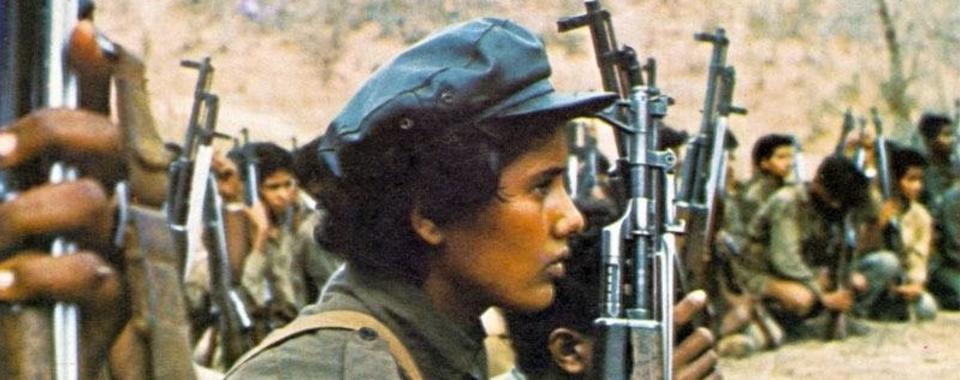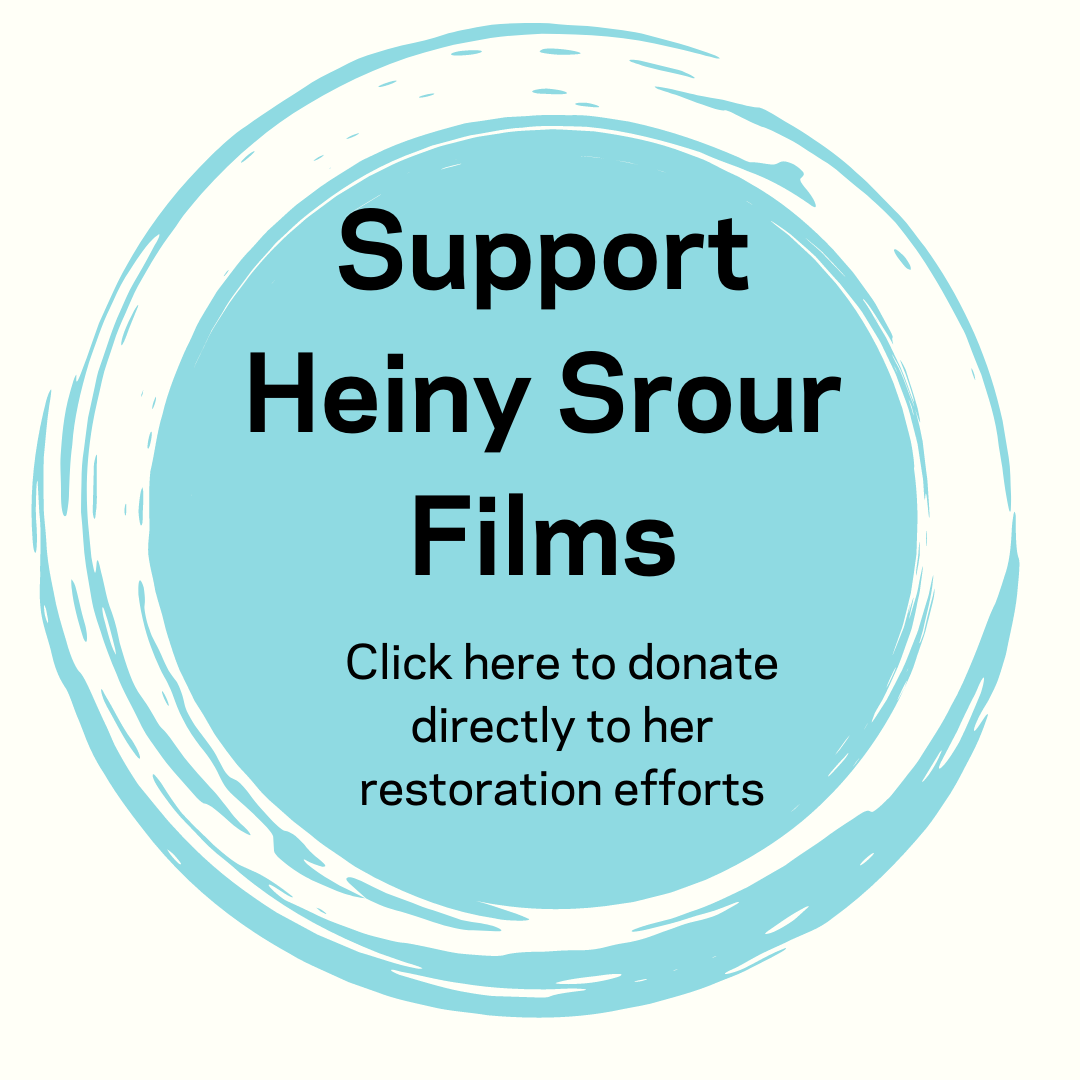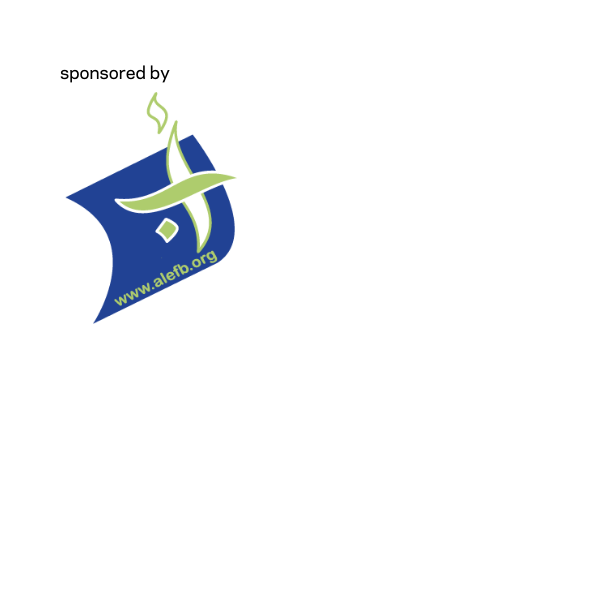
This program is sponsored by Alefb, providing Arabic language and culture through online classes, while creating job opportunities in Lebanon and MENA. For more information: visit their website
The Hour of Liberation Has Arrived (Saat El Tahrir Dakkat) ساعة التحرير دقت
In the late ‘60s, Dhofar rose up against the British-backed Sultanate of Oman, in a democratic, feminist guerrilla movement. Heiny Srour and her team crossed 500 miles of desert and mountains by foot, under bombardment by the British Royal Air Force, to reach the conflict zone and capture this rare record of a now mostly-forgotten war. The Popular Front for the Liberation of the Occupied Arabian Gulf (PFLOAG)— barefoot, without rank or salary— freed a third of the territory, while undertaking a vast program of social reforms and infrastructure projects— schools, farms, hospitals, and roads were built, while illiterate teenage shepherdesses became feminists and 8-year-old school children learned to practice democracy. A still-topical portrait of a liberated society and an exploration of the role of oil in U.S. and British involvement in the Middle East.
 Born in 1945 in Beirut, Heiny Srour studied Sociology at the French University of Beirut (Ecole Supérieure des Lettres) and went on to study Social Anthropology at the Sorbonne in Paris, where she was a student of both Marxist sociologist Maxime Rodinson and anthropologist filmmaker Jean Rouch. In 1969, while pursuing a PhD on the status of Lebanese and Arab women and working as a journalist for AfricAsia magazine, she discovered the struggle of the Popular Front for the Liberation of the Occupied Arabian Gulf, which led an uprising in the province of Dhofar against the British-backed Sultan of Oman.
Born in 1945 in Beirut, Heiny Srour studied Sociology at the French University of Beirut (Ecole Supérieure des Lettres) and went on to study Social Anthropology at the Sorbonne in Paris, where she was a student of both Marxist sociologist Maxime Rodinson and anthropologist filmmaker Jean Rouch. In 1969, while pursuing a PhD on the status of Lebanese and Arab women and working as a journalist for AfricAsia magazine, she discovered the struggle of the Popular Front for the Liberation of the Occupied Arabian Gulf, which led an uprising in the province of Dhofar against the British-backed Sultan of Oman.
Determined to make a film about this feminist movement, she spent two years doing intensive research and finding the necessary funds before setting out to Dhofar. From the Yemeni border, Heiny Srour and her team crossed 500 miles of desert and mountains by foot, under bombardment by the British Royal Air Force, to reach the combat zone and record the only document shot deep inside the Liberated Area. The Hour of Liberation Has Arrived was completed in 1974 and selected at Cannes Film Festival, making Srour the first woman from the Third World to be selected at the prestigious international festival. Including four years of restoration, this documentary took, all in all, ten years of her life. It took her six years to achieve her next film, Leila and the Wolves (1984), in which she unveiled the hidden histories of women in struggle, in particular in Palestine and Lebanon, by weaving an aesthetically and politically ambitious tableau of history, folklore, myth and archival footage. In her words:
“Why shouldn’t women be ambitious? Because men only want women to exclusively deal with women’s issues like home, family and so on, they want to ghettoize us. I resent this. We should deal with the public affairs and political issues too.”
Since initiating a feminist study group in Lebanon in the early 1960s, Heiny Srour has been vocal about the position of women, in particular in Arab societies. She has written and spoken extensively about the image and role of women in Arab cinema. In 1978, along with Tunisian filmmaker Selma Baccar and Egyptian film historian Magda Wassef, she co-authored a manifesto ‘For the Self-Expression of the Arab Woman’, remaining passionately active in her feminist advocacy to this day. More recently, she shot a film in Vietnam (Rising Above: Women of Vietnam, 1995) and was the only filmmaker to film Egyptian protest singer Sheikh Imam in his home and neighbourhood (The Singing Sheikh, 1991).
Filmography
Bread of Our Mountains (1968)
The Hour of Liberation Has Arrived (1974)
‘ساعة التحرير دقت برّه يا إستعمار’
Leila and the Wolves (1984)
‘ليلى و الذئاب’
The Singing Sheikh (1991)
Rising Above: Women of Vietnam (1992)
The Eyes of the Heart (1994)
Les yeux du cœur
Woman Global Strike 2000 (2000)
Restoration Project
Heiny Srour is raising funds for the restoration of her film Leila and the Wolves.
AFMI is committed to help raise awareness, and extend our support.
Leila and the Wolves (1984), her other major work, is a multi-award winner feature film, shot under the bombs of the Lebanese Civil War and sprouting Syrian Civil War. It unveils the hidden histories of women in struggle, in particular in Palestine and Lebanon. Please help support the restoration via gofundme.
- Year1974
- Runtime62 minutes
- LanguageArabic
- CountryLebanon, France
- NoteAll programs include English subtitles
- DirectorHeiny Srour
- ProducerSrour Films
- FilmmakerHeiny Srour
- CinematographerMichel Humeau
- Sound DesignJean- Louis Ughetto
This program is sponsored by Alefb, providing Arabic language and culture through online classes, while creating job opportunities in Lebanon and MENA. For more information: visit their website
The Hour of Liberation Has Arrived (Saat El Tahrir Dakkat) ساعة التحرير دقت
In the late ‘60s, Dhofar rose up against the British-backed Sultanate of Oman, in a democratic, feminist guerrilla movement. Heiny Srour and her team crossed 500 miles of desert and mountains by foot, under bombardment by the British Royal Air Force, to reach the conflict zone and capture this rare record of a now mostly-forgotten war. The Popular Front for the Liberation of the Occupied Arabian Gulf (PFLOAG)— barefoot, without rank or salary— freed a third of the territory, while undertaking a vast program of social reforms and infrastructure projects— schools, farms, hospitals, and roads were built, while illiterate teenage shepherdesses became feminists and 8-year-old school children learned to practice democracy. A still-topical portrait of a liberated society and an exploration of the role of oil in U.S. and British involvement in the Middle East.
 Born in 1945 in Beirut, Heiny Srour studied Sociology at the French University of Beirut (Ecole Supérieure des Lettres) and went on to study Social Anthropology at the Sorbonne in Paris, where she was a student of both Marxist sociologist Maxime Rodinson and anthropologist filmmaker Jean Rouch. In 1969, while pursuing a PhD on the status of Lebanese and Arab women and working as a journalist for AfricAsia magazine, she discovered the struggle of the Popular Front for the Liberation of the Occupied Arabian Gulf, which led an uprising in the province of Dhofar against the British-backed Sultan of Oman.
Born in 1945 in Beirut, Heiny Srour studied Sociology at the French University of Beirut (Ecole Supérieure des Lettres) and went on to study Social Anthropology at the Sorbonne in Paris, where she was a student of both Marxist sociologist Maxime Rodinson and anthropologist filmmaker Jean Rouch. In 1969, while pursuing a PhD on the status of Lebanese and Arab women and working as a journalist for AfricAsia magazine, she discovered the struggle of the Popular Front for the Liberation of the Occupied Arabian Gulf, which led an uprising in the province of Dhofar against the British-backed Sultan of Oman.
Determined to make a film about this feminist movement, she spent two years doing intensive research and finding the necessary funds before setting out to Dhofar. From the Yemeni border, Heiny Srour and her team crossed 500 miles of desert and mountains by foot, under bombardment by the British Royal Air Force, to reach the combat zone and record the only document shot deep inside the Liberated Area. The Hour of Liberation Has Arrived was completed in 1974 and selected at Cannes Film Festival, making Srour the first woman from the Third World to be selected at the prestigious international festival. Including four years of restoration, this documentary took, all in all, ten years of her life. It took her six years to achieve her next film, Leila and the Wolves (1984), in which she unveiled the hidden histories of women in struggle, in particular in Palestine and Lebanon, by weaving an aesthetically and politically ambitious tableau of history, folklore, myth and archival footage. In her words:
“Why shouldn’t women be ambitious? Because men only want women to exclusively deal with women’s issues like home, family and so on, they want to ghettoize us. I resent this. We should deal with the public affairs and political issues too.”
Since initiating a feminist study group in Lebanon in the early 1960s, Heiny Srour has been vocal about the position of women, in particular in Arab societies. She has written and spoken extensively about the image and role of women in Arab cinema. In 1978, along with Tunisian filmmaker Selma Baccar and Egyptian film historian Magda Wassef, she co-authored a manifesto ‘For the Self-Expression of the Arab Woman’, remaining passionately active in her feminist advocacy to this day. More recently, she shot a film in Vietnam (Rising Above: Women of Vietnam, 1995) and was the only filmmaker to film Egyptian protest singer Sheikh Imam in his home and neighbourhood (The Singing Sheikh, 1991).
Filmography
Bread of Our Mountains (1968)
The Hour of Liberation Has Arrived (1974)
‘ساعة التحرير دقت برّه يا إستعمار’
Leila and the Wolves (1984)
‘ليلى و الذئاب’
The Singing Sheikh (1991)
Rising Above: Women of Vietnam (1992)
The Eyes of the Heart (1994)
Les yeux du cœur
Woman Global Strike 2000 (2000)
Restoration Project
Heiny Srour is raising funds for the restoration of her film Leila and the Wolves.
AFMI is committed to help raise awareness, and extend our support.
Leila and the Wolves (1984), her other major work, is a multi-award winner feature film, shot under the bombs of the Lebanese Civil War and sprouting Syrian Civil War. It unveils the hidden histories of women in struggle, in particular in Palestine and Lebanon. Please help support the restoration via gofundme.
- Year1974
- Runtime62 minutes
- LanguageArabic
- CountryLebanon, France
- NoteAll programs include English subtitles
- DirectorHeiny Srour
- ProducerSrour Films
- FilmmakerHeiny Srour
- CinematographerMichel Humeau
- Sound DesignJean- Louis Ughetto

